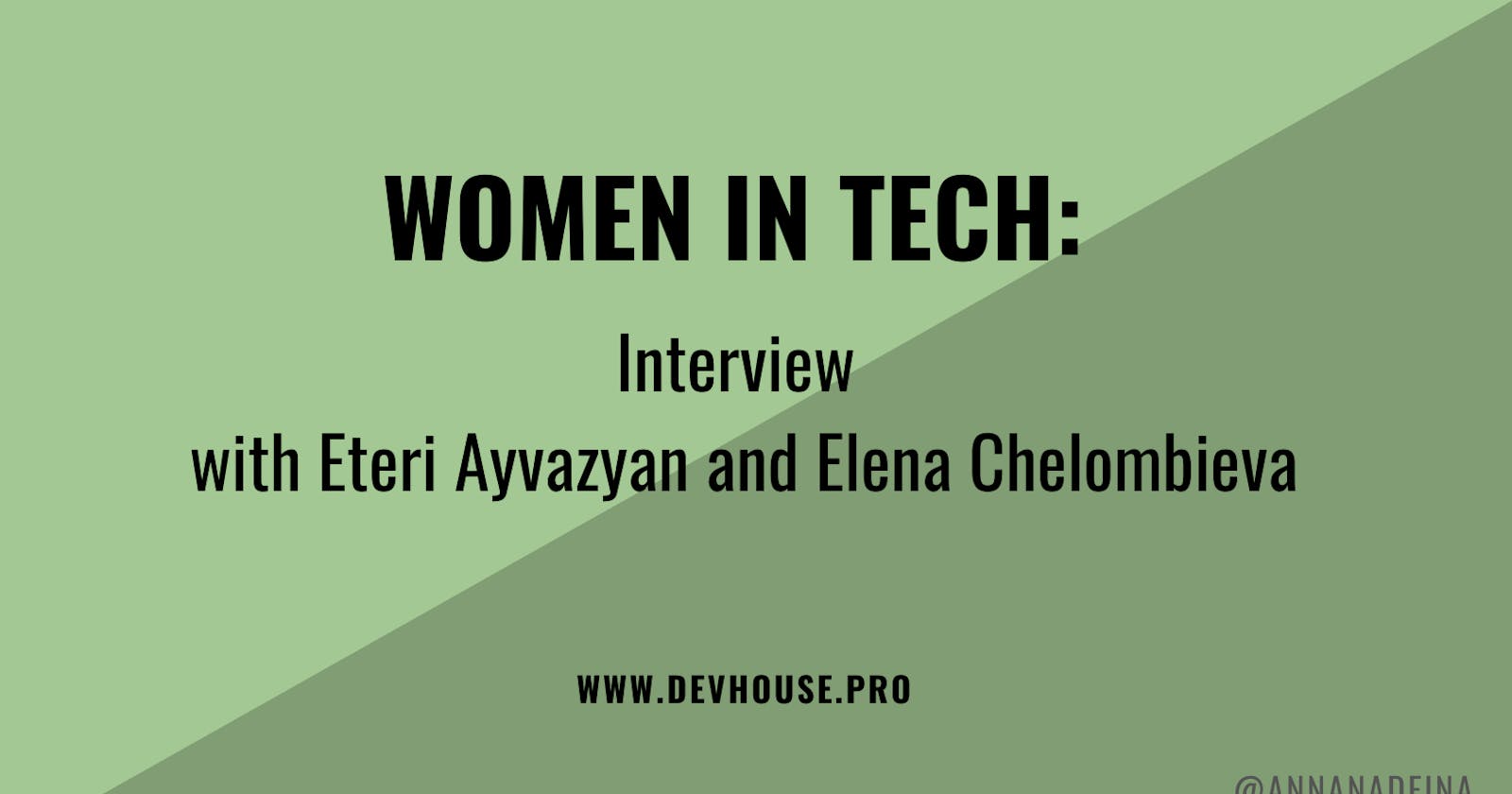Devhouse is a development company that has grown organically over the past 10 years. We never really emphasized inclusion or purposefully diversified our hiring process. Yet, as of today, 30% of Devhouse are women. And we are proud of that. We never judged our employees on gender grounds and would give equal tasks to men and women applying for the job.
Now, this kind of diversity works best for Devhouse and we are trying to leverage every aspect of it. Women managers are taking great action to promote team members' well-being— helping them manage their workloads, and providing support. Therefore, creating a respectful environment, where contributions are valued and team members feel connected to their peers.
Today we want to talk to two amazing Project Managers: Eteri Ayvazyan and Elena Chelombieva and find out what made them choose this career, what challenges they have faced, and if there was any kind of discrimination that they experienced along the way.
What’s your background? How did you get into the IT field?
Elena: My background is, actually, in HR. I’ve been working as HR manager in an IT company for a few years. I loved the creativity and freedom of the place. The IT industry seemed like a perfect choice for me, yet HR had certain boundaries. That’s why when I learned more about Project management, given my education, knowledge, and acquired skills, it became a logical next step for me.
Eteri: My way to IT started in Armenia. I have entered an IT company as an administrative assistant, then been promoted to a Customer support specialist. As we were training our customers, introducing them to the platform, I started to gain new skills. I learned how the platform works, why users receive issues, etc, and gradually it turned into testing activity. So, for the first time, I heard about quality assurance. When I decided to change my job, I started to look for a Junior QA specialist vacancy and ended up in one of the IT companies in Yerevan. 2 years later I got an opportunity to work as a PM in the same company. This was a real gift because at that moment I was interested in project management. Years later I started to look for a chance to work abroad and was lucky to land in Devhouse.
Was it difficult to switch careers? How did your previous experience help/challenge you?
Elena: Changing industries is always a challenge. In my case, I made a very conscious decision after the evaluation of my skills and predispositions. For me, the most stressful thing was going into an environment where all the communications are carried out in English, and I was not quite ready for that. That was challenging and stressful up until very recently. However, I received a lot of support and gained the necessary skills to move forward.
Eteri: There were fewer difficulties than I was expecting. My main fear was that the team I first entered as a PM would not accept me in the role after being a QA. But this didn’t happen. At least, I didn’t notice anything in their behavior. On the contrary, my colleagues and CEOs were patient and ready to explain and advise. I am grateful to everyone for such an approach.
Do you notice a lack of women in technology? If so, why do you think that’s the case?
Eteri: The number of women in IT is growing. There is a huge prejudice about women not being good tech specialists. Depending on society this may be a reason why girls don’t think of choosing a profession in this sphere. Though their presence there comes to prove the opposite. I have worked with female developers (e.g.) who were very smart and organized.
What skills are essential for a PM job?
Elena: Networking skills, flexibility, emotional intelligence, and a sincere desire to help are very important. You have to be ready to multitask, keep track of lots of things at once, be punctual, be ready to make mistakes, learn from them and make new ones to grow.
Eteri: I totally agree. Being a PM is not as much about the hard tech skills as it is about the soft ones. I have seen PMs with rich professional knowledge and having international certifications but with no ability to respect and behave properly to the team. Professional knowledge can be received through learning, but soft skills are really the most essential. So their lack of them can be an obstacle in one’s career; at least to my understanding.
Professional knowledge can be received through learning, but soft skills are really the most essential.
Some of your team members and all the clients are allocated in different cities and countries. How is that managed and do you have any tips for working with distributed teams?
Elena: Honestly, I worked with remote teams throughout my career and have to say that now it’s easier than ever. You just have to keep track of the time difference and remember to always be extra polite in your emails. People don’t hear your tone through email and it may appear harsher in writing, so be nice.
Eteri: Absolutely! And communication is key. PM is a bridge between the clients, requirements, and business and the development team. Everyone should know what’s happening in the project, what are the short-term and long-term goals, what dependencies there are, what is the plan and tasks to work on, etc. If clients are informed about the development process and the team clearly understands its tasks and project goals, no major problems should occur neither in allocated teams nor in on-site ones.
People don’t hear your tone through email and it may appear harsher in writing, so be nice.
How do you keep up with the project management world? Books? Blogs? Conferences?
Elena: I sign up for professional courses, read books, watch relevant videos and online lectures. It’s important to keep track of what’s happening in the industry, but you have to choose your sources carefully and not waste time on irrelevant information.
Eteri: Yes, exactly the same way as everyone. Mostly it is reading books, articles, sometimes joining online meet-ups, and, of course, sharing expertise with colleagues and mentors.
Do you think there are any special challenges that women face in the field?
Elena: I never faced any discrimination at work. Honestly, if someone thinks women are less intelligent/capable or strong, it’s their problem, there are tons of examples that prove them wrong.
Eteri: It depends on the culture and society we live in. I have lived and worked in Armenia, and never faced any gender-related issues. Now I live and work in Russia, and again there is no such an issue at my workplace. I know in some societies (despite the field) gender influences a lot of factors, including salary. Still, I am glad it is not a matter of discussion for me and my colleagues.
Honestly, if someone thinks women are less intelligent/capable or strong, it’s their problem, there are tons of examples that prove them wrong.
How can women raise their profiles in their roles and industry?
Elena: Even though historically the tech industry is referred to as a men’s ground, women should not be afraid of the field. It is for everyone who’s ready to learn and is not afraid of challenges.
Eteri: Constant education and continuous improvement are, indeed, important factors for success and not only in our industry.
Have you faced any challenges or any sort of discrimination in your experience?
Elena: Well, we face different problems with our projects, but I always try to buckle up, find the best possible solution and move on to the next task. When it comes to discrimination, it was never my experience. I think that the people I work with are intelligent and professional enough to treat colleagues with respect.
Eteri: The only challenge I have faced is not having deep technical knowledge. From time to time I think it would be way easier if I were a developer first.
How do you see PM developing in the next 5 years? What set of skills will be essential for success?
Elena: In my opinion, it’s safe to say that IT specialists will be in demand even in 5 years. As Eteri mentioned, soft skills will be as essential as ever. You can teach AI all the tech skills you want but in our job, it’s important to feel the room, and I doubt you can teach that.
Do you have any advice for women in project management that want a similar career?
Elena: If you want to change your field, do it sooner rather than later. It will most definitely be challenging and stressful, but it’s totally worth it. Remember, all the boundaries are only in your head.
Eteri: Not to be afraid of experiments. The IT sphere is not an unreachable one.

